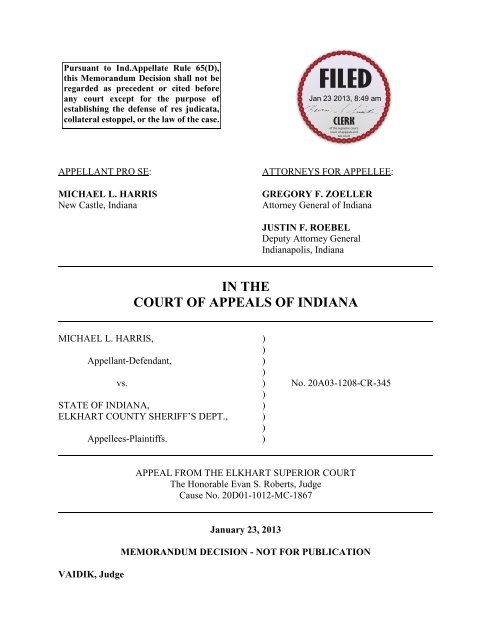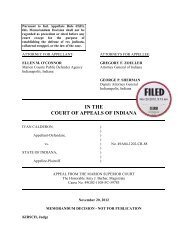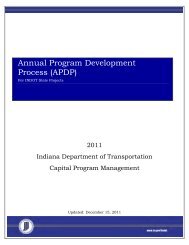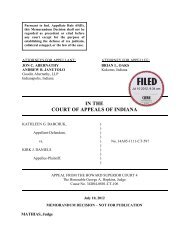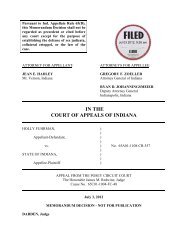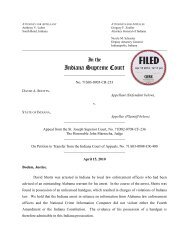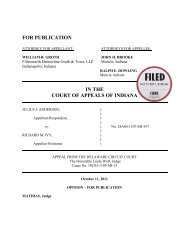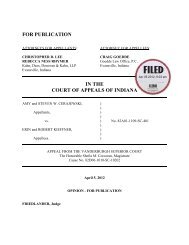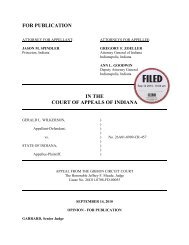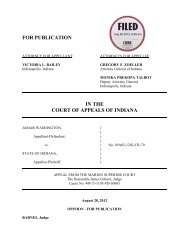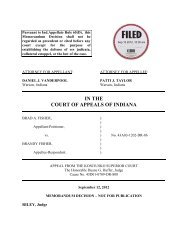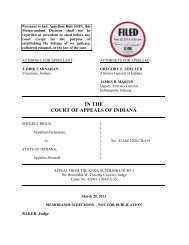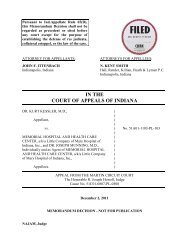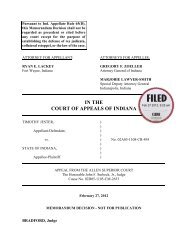Michael L. Harris v. State of Indiana, Elkhart County Sheriff's Dept.
Michael L. Harris v. State of Indiana, Elkhart County Sheriff's Dept.
Michael L. Harris v. State of Indiana, Elkhart County Sheriff's Dept.
Create successful ePaper yourself
Turn your PDF publications into a flip-book with our unique Google optimized e-Paper software.
Pursuant to Ind.Appellate Rule 65(D),<br />
this Memorandum Decision shall not be<br />
regarded as precedent or cited before<br />
any court except for the purpose <strong>of</strong><br />
establishing the defense <strong>of</strong> res judicata,<br />
collateral estoppel, or the law <strong>of</strong> the case.<br />
APPELLANT PRO SE:<br />
MICHAEL L. HARRIS<br />
New Castle, <strong>Indiana</strong><br />
ATTORNEYS FOR APPELLEE:<br />
GREGORY F. ZOELLER<br />
Attorney General <strong>of</strong> <strong>Indiana</strong><br />
JUSTIN F. ROEBEL<br />
Deputy Attorney General<br />
<strong>Indiana</strong>polis, <strong>Indiana</strong><br />
IN THE<br />
COURT OF APPEALS OF INDIANA<br />
MICHAEL L. HARRIS, )<br />
)<br />
Appellant-Defendant, )<br />
)<br />
vs. ) No. 20A03-1208-CR-345<br />
)<br />
STATE OF INDIANA, )<br />
ELKHART COUNTY SHERIFF’S DEPT., )<br />
)<br />
Appellees-Plaintiffs. )<br />
APPEAL FROM THE ELKHART SUPERIOR COURT<br />
The Honorable Evan S. Roberts, Judge<br />
Cause No. 20D01-1012-MC-1867<br />
VAIDIK, Judge<br />
January 23, 2013<br />
MEMORANDUM DECISION - NOT FOR PUBLICATION
Case Summary<br />
<strong>Michael</strong> L. <strong>Harris</strong>, pro se, appeals the trial court’s denial <strong>of</strong> his request for return<br />
<strong>of</strong> property.<br />
He argues that the trial court has showed a callous disregard for his<br />
constitutional rights by retaining his property. <strong>Harris</strong> also contends that the warrant used<br />
to seize his property was invalid both for lack <strong>of</strong> probable cause and for its reliance on<br />
stale information. Finding that <strong>Harris</strong>’s property is now in the possession <strong>of</strong> the federal<br />
government, we can provide him no effective relief. As a result, this case is moot and we<br />
therefore dismiss it.<br />
Facts and Procedural History<br />
In 1999, <strong>Harris</strong> was convicted <strong>of</strong> a sex <strong>of</strong>fense and was required to register as a<br />
sex <strong>of</strong>fender upon his release from incarceration. <strong>Harris</strong>’s status as a sex <strong>of</strong>fender<br />
prohibited him from using certain social-media websites such as YouTube.com. When<br />
<strong>Harris</strong> last updated his sex-<strong>of</strong>fender registration in 2010, he indicated that he did not use<br />
any social-networking sites. Appellant’s App. p. 28.<br />
<strong>Elkhart</strong> <strong>County</strong> Sheriff’s Department Detective Brian Holloman reviewed <strong>Harris</strong>’s<br />
business website during the course <strong>of</strong> his duties and found a video posted on<br />
YouTube.com that contained <strong>Harris</strong>’s voice. Id. at 27. The YouTube.com account name<br />
related to the video was “ArtsPromo” and “ArtsPromo’s Channel” and contained “several<br />
videos” <strong>of</strong> <strong>Harris</strong> in addition to “numerous ‘Favorites’ videos <strong>of</strong> boys obviously under<br />
the age <strong>of</strong> 18.” Id. Detective Holloman learned through subpoenas duces tecum that the<br />
“ArtsPromo” account and related email address could both be tracked to the internet IP<br />
address associated with <strong>Harris</strong>’s residence. Id. at 27-28. <strong>Harris</strong> had not registered the<br />
2
elated email address during his sex-<strong>of</strong>fender registration, and <strong>of</strong>ficers had previously<br />
observed computer equipment at <strong>Harris</strong>’s residence.<br />
Based on that information, Detective Holloman sought a warrant to seize<br />
“computer hardware (and associated peripherals), cameras, video recording devices,<br />
storage devices, recordings, photographs, digital media images, and any document that<br />
might show passwords.” Id. at 30. <strong>Elkhart</strong> Superior Court authorized the search warrant<br />
on December 3, 2010, and forty items or categories <strong>of</strong> items were seized. However, no<br />
charges were filed.<br />
Beginning in June 2011, <strong>Harris</strong> started filing repeated requests and motions for the<br />
return <strong>of</strong> his seized property. In November 2011, the trial court denied him relief,<br />
holding that the <strong>State</strong> was not the proper party since the items were seized by the <strong>Elkhart</strong><br />
<strong>County</strong> Sheriff. <strong>Harris</strong> revised his motion, and before the scheduled hearing, the <strong>Elkhart</strong><br />
<strong>County</strong> Sheriff’s Department returned most <strong>of</strong> the seized items to <strong>Harris</strong>’s wife, Rebecca.<br />
At that point, the evidence release form listed sixty-nine seized items and categories <strong>of</strong><br />
items and indicated that forty <strong>of</strong> them had been returned. The Sheriff’s Department noted<br />
that the remaining items were not returned due to “Federal prohibition” and were “being<br />
held by the U.S. Secret Service Pending Federal Indictment.” Id. at 35.<br />
Less than two weeks later, when the hearing on <strong>Harris</strong>’s revised motion did take<br />
place, the trial court denied the motion, thereby denying the return <strong>of</strong> his remaining<br />
property. <strong>Harris</strong> now appeals.<br />
Discussion and Decision<br />
3
<strong>Harris</strong> raises three arguments on appeal: (1) whether the trial court erred in<br />
denying his request for return <strong>of</strong> property; (2) whether the search warrant was faulty for<br />
lacking probable cause; and (3) whether the search warrant was faulty for being based on<br />
stale information. However, since we find that the trial court did not err because <strong>Harris</strong>’s<br />
claim is moot, we need only address his first argument.<br />
<strong>Harris</strong> contends that the trial court erred in denying his request for return <strong>of</strong><br />
property. We disagree. A trial court’s denial <strong>of</strong> a motion for return <strong>of</strong> property will only<br />
be reversed if it is clearly erroneous and “cannot be sustained upon any legal theory<br />
supported by the evidence.” Merlington v. <strong>State</strong>, 839 N.E.2d 260, 262 (Ind. Ct. App.<br />
2005). In this instance, we find that the trial court did not err because <strong>Harris</strong>’s claim is<br />
moot.<br />
A case is considered moot when it “is no longer live and the parties lack a legally<br />
cognizable interest in the outcome <strong>of</strong> its resolution or where no effective relief can be<br />
rendered to the parties.” Lake Cnty. Bd. <strong>of</strong> Elections and Registration v. Copeland, 880<br />
N.E.2d 1288, 1291 (Ind. Ct. App. 2008), reh’g denied. The <strong>State</strong> has no effective relief<br />
that it can render to <strong>Harris</strong> because the evidence is no longer in possession <strong>of</strong> a <strong>State</strong><br />
entity and is now in the hands <strong>of</strong> the federal government.<br />
As a result <strong>of</strong> the inherent immunity rooted in the Supremacy Clause, federal<br />
<strong>of</strong>ficers are immune “for actions reasonable and necessary in the discharge <strong>of</strong> their<br />
federal responsibilities.” Wyoming v. Livingston, 443 F.3d 1211, 1217 (10th Cir. 2006).<br />
“Absent a waiver <strong>of</strong> sovereign immunity, a federal agency, as representative <strong>of</strong> the<br />
sovereign, cannot be compel[led] . . . to act.” In re S.E.C. ex rel. Glotzer, 374 F.3d 184,<br />
4
190 (2d Cir. 2004). Therefore, now that the United <strong>State</strong>s Secret Service has the items<br />
due to a pending federal indictment, Appellant’s App. p. 35, this Court cannot compel the<br />
return <strong>of</strong> <strong>Harris</strong>’s property; any relief must be sought from the federal government.<br />
We therefore can provide no effective relief in this case and find that <strong>Harris</strong>’s<br />
claim is moot.<br />
Dismissed.<br />
BAILEY, J., and BROWN, J., concur.<br />
5


